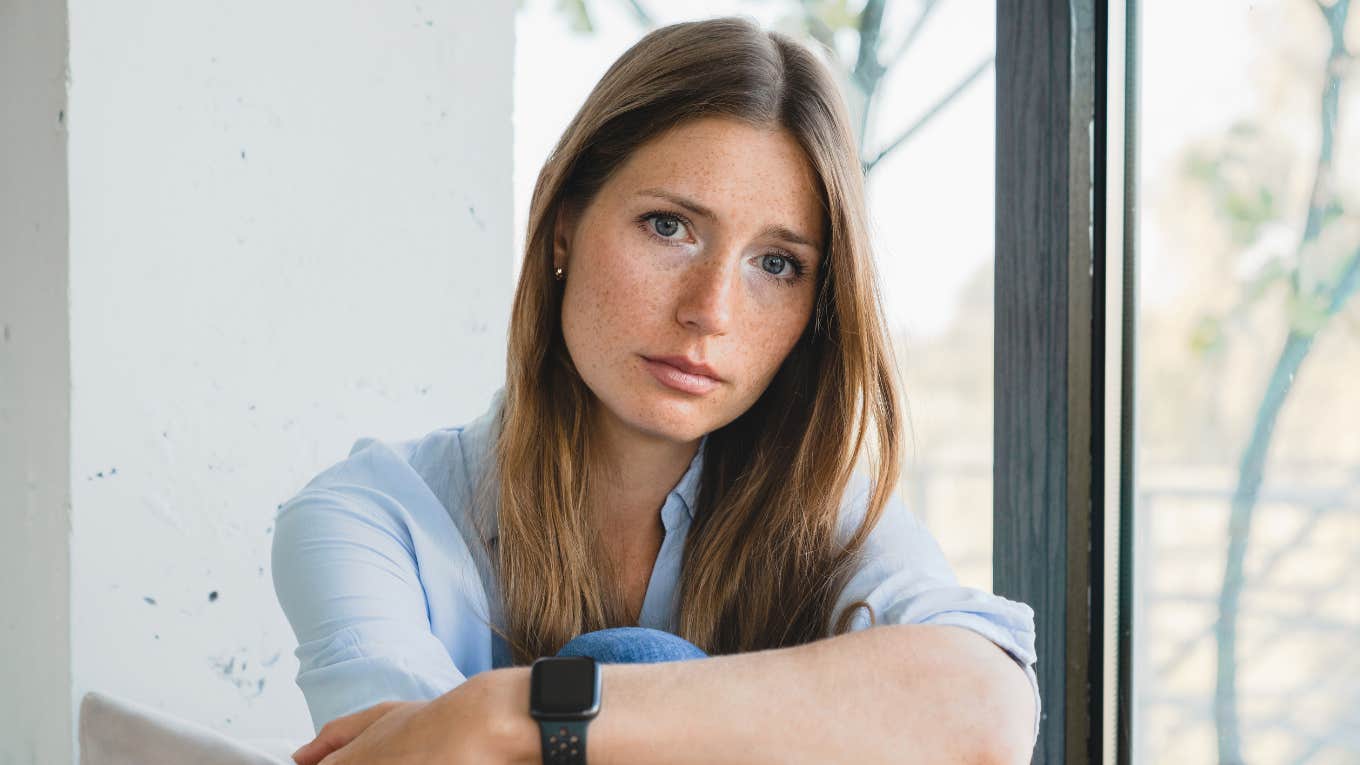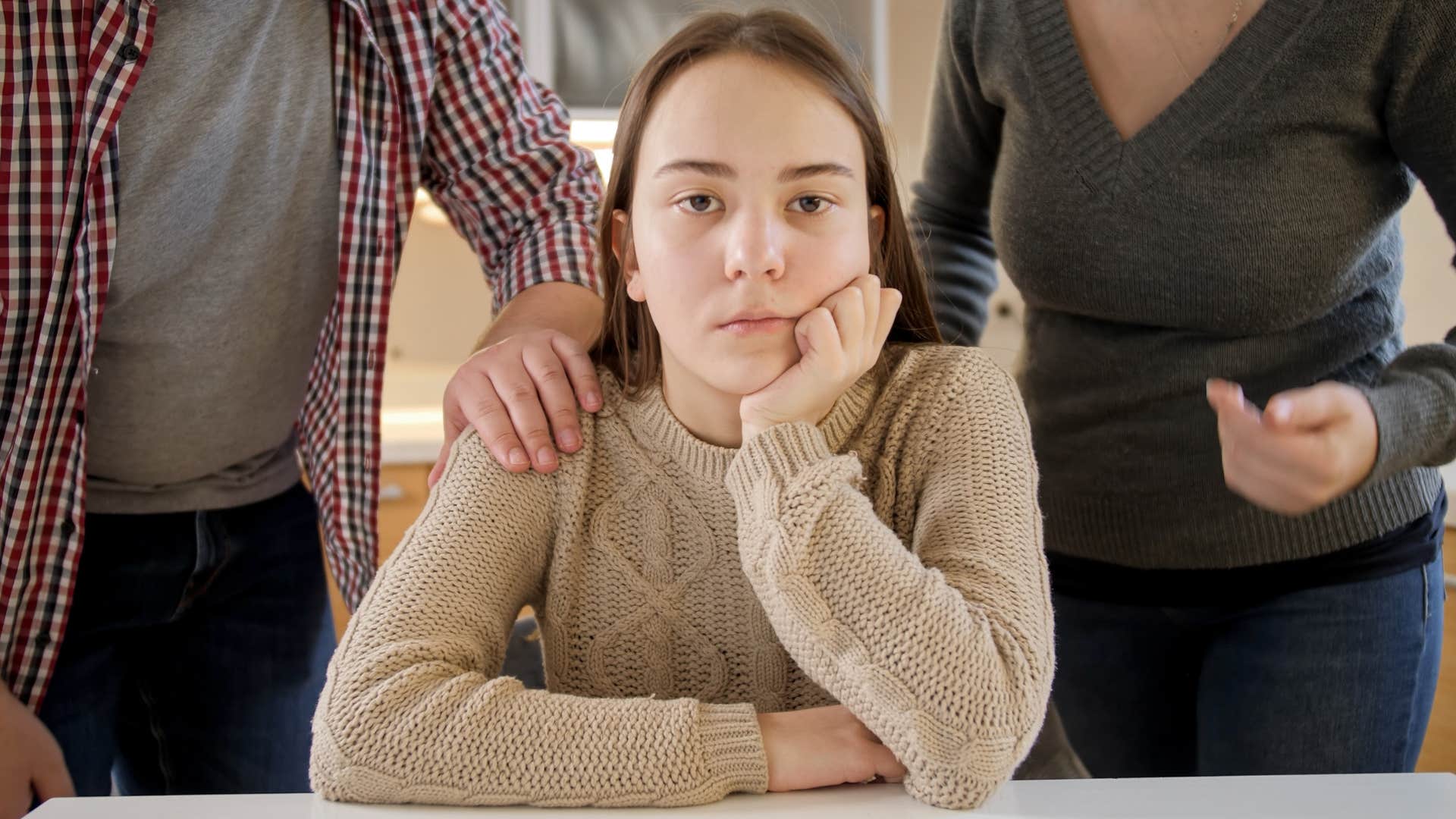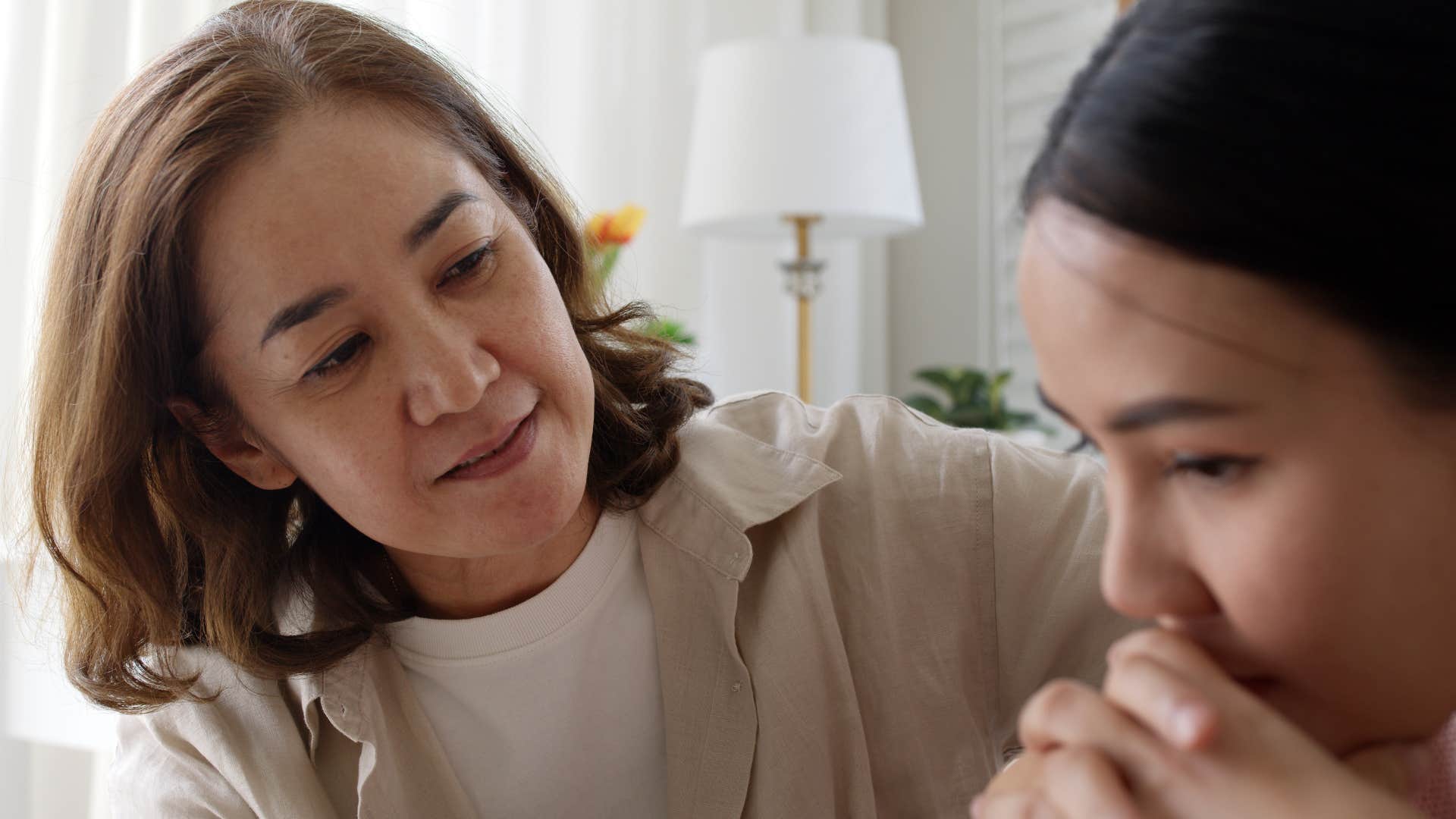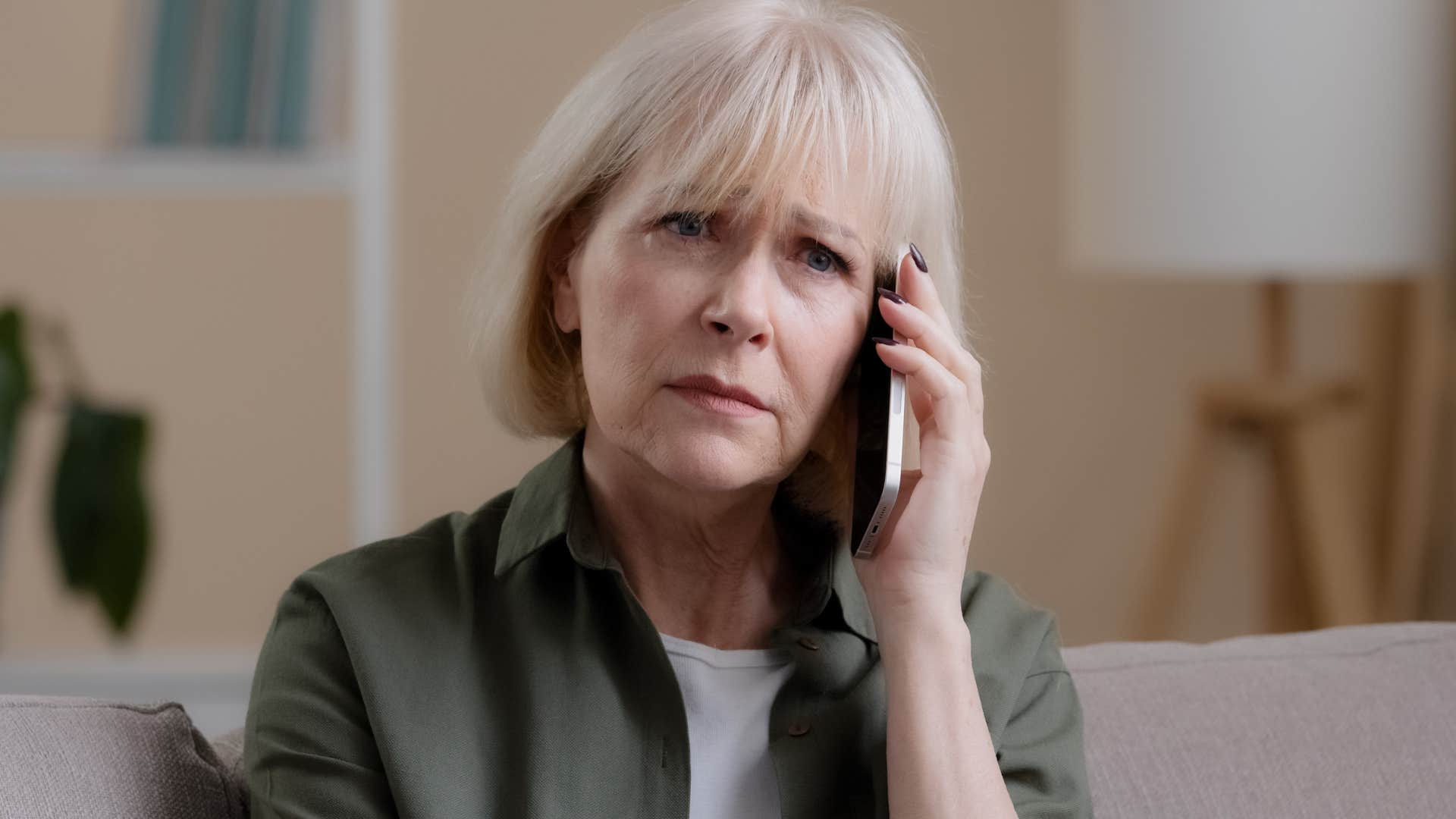11 Phrases Adult Children Say When They're Deeply Unhappy But Don't Want Their Parents To Know
Adult children don't want to upset their parents, even though they're hiding something important.
 Inside Creative House | Shutterstock
Inside Creative House | Shutterstock Navigating early adulthood isn't easy for anyone. From coping with financial insecurity, to navigating new relationships, and even grappling with the natural disconnect between your family that happens when you leave the house, it's not uncommon to deal with mental health concerns, chronic stress, or anxiety. However, seeking support and asking for help is the best way to cope with these situations, alongside self-care, healthy solitude, and identity building.
However, many adult children, stuck in cycles of people-pleasing behavior and low self-esteem, avoid their emotions and hide their issues from their loved ones, rather than opening up. Many of the phrases adult children say when they're deeply unhappy but don't want their parents to know stem from these insecurities, sabotaging their family dynamics and deepening their emotional turmoil.
Here are 11 phrases adult children say when they're deeply unhappy but don't want their parents to know
1. 'I'm just really tired'
 Gladskikh Tatiana | Shutterstock
Gladskikh Tatiana | Shutterstock
Oftentimes, the physical symptoms of depression and emotional turmoil that pop up in our daily lives mirror that of fatigue or exhaustion, like a 2004 study explains, whether it's mood swings, drowsiness, or a general lack of energy. When an adult child says "I'm just really tired" to justify these symptoms, especially if it becomes a pattern, it could be one of the signs that they're deeply unhappy but don't want their parents to know.
In some cases, chronic stress and emotional struggles can lead to a loss of sleep or a worsening of sleep quality, so it's not always that adult children are trying to be deceitful of their mental health struggles, but that they don't quite understand their source just yet.
2. 'I'll figure it out'
 Gladskikh Tatiana | Shutterstock
Gladskikh Tatiana | Shutterstock
Especially for adult children that have a sense of hyper-independence or developed people-pleasing behaviors from their childhood, it's common for them to undermine their own needs and struggles for the sake of their family's comfort.
Even when they need emotional support and a shoulder to cry on, they'd prefer to use a phrase like "I've got it" or "I'll figure it out" to relieve their parents or siblings from taking on any kind of emotional burden.
Of course, their needs aren't emotional burdens, whether they make parents uncomfortable or not. Everyone deserves to have a safe space in their relationships to be vulnerable and open, no matter what's going on in their lives.
3. 'I've been busy'
 pixelheadphoto digitalskillet | Shutterstock
pixelheadphoto digitalskillet | Shutterstock
While it's often healthy for people to take space from their parents later in life to cope with a changing routine, unresolved childhood trauma, or resentment, according to experts from the Newport Institute, it can also be one of the unsuspecting signs an adult child is deeply unhappy, but doesn't want their parents to know.
If they hit the point of being unable to people-please, put on a facade, or hide their true emotional struggle, they avoid hanging out with their parents or even responding to calls. Even though many adult children view these avoidant behaviors as a way to protect their own comfort and their family's well-being, they only further isolate them from the support, help, and acknowledgment they need to get better.
4. 'It's not a big deal'
 kryzhov | Shutterstock
kryzhov | Shutterstock
According to psychotherapist Yolanda Renteria, initial signs of mental health concerns and emotional distress are often subtle — like small behavioral changes, fatigue, or a higher interest in solitude. Even if an adult child hasn't yet acknowledged the consequences of those shifts, they'll use a phrase like "it's not a big deal" to dismiss them.
Like counselor Hannah Rose suggests, even if their loved ones are struggling — like their parents or families — that doesn't mean adult children should minimize their own subtle concerns and struggles. Even in tumultuous times of grief and hardship, it's important to find belonging, support, and community with your loved ones — that's how everyone heals in the long run.
5. 'I don't want to talk about it'
 Chay_Tee | Shutterstock
Chay_Tee | Shutterstock
Many adult children who hide their mental health concerns and struggles from their parents are worried about the repercussions. Whether it's a mental health stigma rooted in their own family, judgment, or a recognition of their parents' struggles, the phrases adult children say when they're deeply unhappy but don't want their parents to know are often to cope with the fear of rejection or criticism.
It's essentially an emotional wall that protects them from needing to get vulnerable and overlook the facade they might have crafted in their family relationships in adulthood. For some, it's simply driven by internalized shame — they don't want their parents to know they're struggling, because they're seeking approval or trying to live up to their parents' expectations.
6. 'I've had a lot going on this week'
 fizkes | Shutterstock
fizkes | Shutterstock
Many of the phrases adult children say when they're deeply unhappy but don't want their parents to know are intended to shift the focus of conversations, even if it subtly dismisses and invalidates their experiences.
Even if they haven't had anything going on and are actually experiencing the hardship of isolation and loneliness, it's not uncommon for people to adopt unhealthy coping mechanisms and vices to cope, like a 2014 study explains, using phrases like this to dodge questions and concerns about their habits.
7. 'You have bigger things to worry about'
 Prostock-studio | Shutterstock
Prostock-studio | Shutterstock
While people-pleasers tend to be seen as highly empathetic and helpful, the behavior can quickly spiral into a toxic coping mechanism that sparks low self-esteem, discomfort, anxiety, and emotional turmoil. Especially for adult children, who try to protect their parents' well-being and emotions above their own, these behaviors can subtly spark resentment and disconnection, even if it's entirely subconscious.
Even if it seems like the right thing to do — hiding your struggles to "protect" your parents — it's only reinforcing a toxic belief that your needs and emotions are a burden to others. Even if it's a hard conversation to have, seeking support can never be an inherently bad thing, especially from the people that love you.
8. 'I'm used to it'
 MAYA LAB | Shutterstock
MAYA LAB | Shutterstock
Over three-quarters of Americans currently have unhealthy coping mechanisms for dealing with internal struggles, stress, and mental health concerns, whether that means leaning into toxic relationships, relying on unhealthy vices for comfort, or distracting themselves with screen-time and technology.
These coping mechanisms and the ritual of seeking comfort and instant gratification can become a routine, urging people to defend their habits in the face of concern and grow angry when people try to support change. Phrases like "I'm used to it" or "this is the way I'm choosing to live" are all defensive ways for adult children to avoid getting to the root of their problems.
They'd prefer to protect not only their family from the complex emotions and struggles they perceive to be "burdens," they're also "protecting" themselves from facing discomfort or fear.
9. 'I don't want to bring down the mood'
 imtmphoto | Shutterstock
imtmphoto | Shutterstock
People-pleasing behaviors can manifest in a number of ways, especially in family dynamics where kids have been taught to protect their parents' comfort and the peace in their households from a very young age.
Adult children may use a phrase like "I don't want to bring down the mood" to avoid talking about their own emotions, but they're also concerned with keeping the peace. They don't want to make other people feel uncomfortable, so they'd prefer to suppress their uncomfortable emotions and avoid them as a self-preserving and people-pleasing mechanism.
10. 'I'm fine'
 Aloha Hawaii | Shutterstock
Aloha Hawaii | Shutterstock
According to psychiatrist Yalda Safai, many people who are dealing with mental health concerns, but are afraid to ask for help or seek support, are spending most of their emotional energy suppressing their struggles. Whether it's avoiding acknowledging their complex emotions or hiding from vulnerability in their relationships, it's not uncommon for someone trying to hide their struggle to overuse a phrase like "I'm fine."
Even when they truly need help and support, they'd prefer to put on a brave face, avoid vulnerability, and people-please their way into solitude. While there are a number of reasons why an adult child may do this — from insecurity, to low self-esteem, and even resentment in their family dynamics — it can be one of the subtle signs of their struggles.
11. 'You wouldn't understand'
 ViDI Studio | Shutterstock
ViDI Studio | Shutterstock
While it's true that there are a lot of generational gaps around discussions of mental health, emotional well-being, and support, "you wouldn't understand" is one of the phrases adult children say when they're deeply unhappy but don't want their parents to know. But it only encourages people to turn their back to vulnerability and true support.
If your parents don't know what you're going through, they can't help you, but they also don't have a chance to learn and grow. Don't wait until the last minute to ask for help, when everything is overwhelming and piling on top of each other. You will not only have the mental space and capacity to remind people what you need and set boundaries around support, you can bond and craft more meaningful family relationships as well.
Zayda Slabbekoorn is a staff writer with a bachelor's degree in social relations & policy and gender studies who focuses on psychology, relationships, self-help, and human interest stories.

